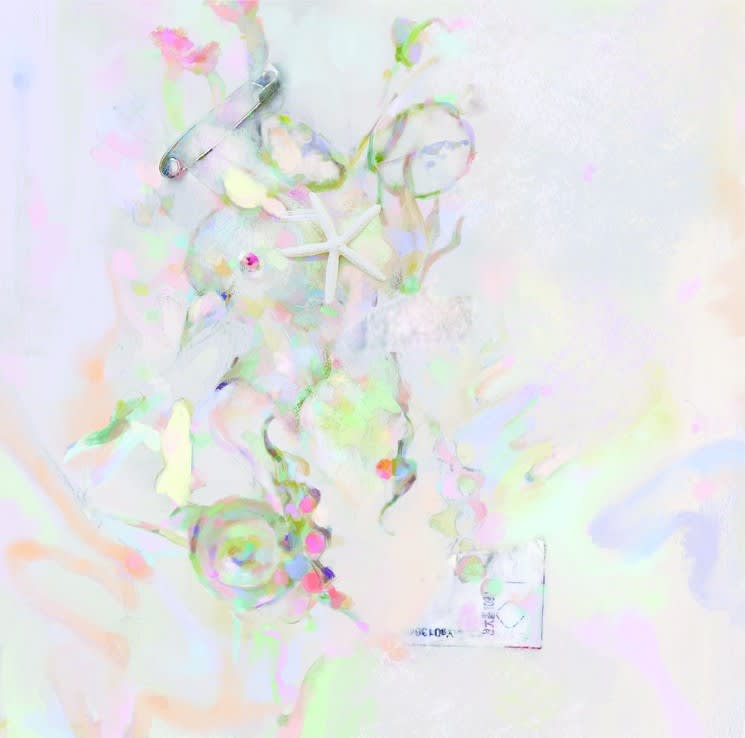Having released their playful and collaborative self-titled debut in 2021, Montreal's Afternoon Bike Ride glide along joyfully with Glossover. This new record sees the trio defining their sound and refining their purpose through a soft palette of lo-fi guitars, silky harmonies, and sentimental soundscapes. Much like a forest path, Glossover is never the same twice, and it induces awe through the subtlety of its variations.
Glossover glows with the comforts of friendship and finds Afternoon Bike Ride manifesting the obvious security they feel as a group, inviting the listener into that space of ease and understanding. Much like Florist's self-titled masterpiece from last year, Afternoon Bike Ride manage to capture this feeling of friendship (with the help of a few carefully chosen collaborators) through songs that highlight their experimental creation process. It feels as though you're listening to the song compose itself in real time, with each cozy dalliance falling effortlessly into place.
In "Before We Don't Have Time," field recordings and vocal harmonies softly twist into streams of electronics and brass. "When We Were The Same" fades out, only to re-emerge with a scrappy acoustic recording, raucous vocals, and the loudest electric guitars on the record — which fall into laughter and gentle synth swells with grace. Though not shy about sticking to pop structures here and there, Glossover shines most when it follows its own path.
While the album often feels airy, it's musically and thematically grounded in a subtle but inevitable conflict: the passing of time. Sonically, the album manages to sound both timeless and familiar, with tracks like "Nothing in Particular" borrowing affectionately from early-2000s pop production (think Soccer Mommy's "Circle the Drain"), and the regular use of lo-fi sounds and fluttering vintage synths, all blending together into a nostalgic soup.
This is complemented by songs that reference drifting relationships and passing seasons, as well as more grounded examples of time passing, as when Lia Kurihara sings about an only child dealing with an aging father who is "losing sense of who he is and who he isn't." There's a lot at stake across this album, but the listener is reassured from the first stanza of "For the Breakdowns" that the end of the trail is compassion: "Wiping clean the slate I sat with / Four years behind me ... I learned to love myself / I learned to love deep." While the path to self-love twists and turns, it's well worth taking.
(Friends of Friends)Glossover glows with the comforts of friendship and finds Afternoon Bike Ride manifesting the obvious security they feel as a group, inviting the listener into that space of ease and understanding. Much like Florist's self-titled masterpiece from last year, Afternoon Bike Ride manage to capture this feeling of friendship (with the help of a few carefully chosen collaborators) through songs that highlight their experimental creation process. It feels as though you're listening to the song compose itself in real time, with each cozy dalliance falling effortlessly into place.
In "Before We Don't Have Time," field recordings and vocal harmonies softly twist into streams of electronics and brass. "When We Were The Same" fades out, only to re-emerge with a scrappy acoustic recording, raucous vocals, and the loudest electric guitars on the record — which fall into laughter and gentle synth swells with grace. Though not shy about sticking to pop structures here and there, Glossover shines most when it follows its own path.
While the album often feels airy, it's musically and thematically grounded in a subtle but inevitable conflict: the passing of time. Sonically, the album manages to sound both timeless and familiar, with tracks like "Nothing in Particular" borrowing affectionately from early-2000s pop production (think Soccer Mommy's "Circle the Drain"), and the regular use of lo-fi sounds and fluttering vintage synths, all blending together into a nostalgic soup.
This is complemented by songs that reference drifting relationships and passing seasons, as well as more grounded examples of time passing, as when Lia Kurihara sings about an only child dealing with an aging father who is "losing sense of who he is and who he isn't." There's a lot at stake across this album, but the listener is reassured from the first stanza of "For the Breakdowns" that the end of the trail is compassion: "Wiping clean the slate I sat with / Four years behind me ... I learned to love myself / I learned to love deep." While the path to self-love twists and turns, it's well worth taking.
